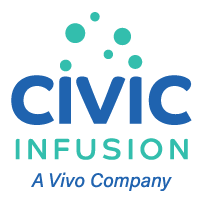Civic Infusion is now Vivo Infusion.
Same Great People. Same Great Care.
It is our pleasure and privilege to welcome you to our Vivo community. We want to ensure your convenience as we transition our Civic Infusion clinics to the Vivo Infusion processes. We invite and encourage you to explore the entire Vivo Infusion website.
Civic Infusion
Treatment Referral Forms
Simply complete and fax the appropriate referral form. Our care team will handle the rest, including insurance verifications.


